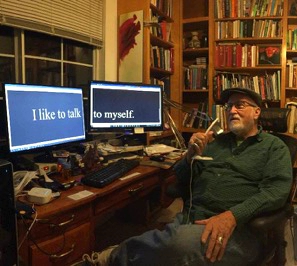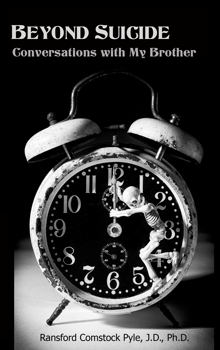
I am particularly excited this Christmas because my latest book—of conversations with myself (and my brother)—may come out just in time for Christmas. I joked with my daughters over Thanksgiving that I was planning to give signed copies as Christmas presents. This is especially curious because of the subject embodied in the title: Beyond Suicide; Conversations with My Brother. I suppose the gift might be signed “To my dear daughter Andrea [or one of my five other daughters], from Ebenezer Scrooge.”
Conversations with my dead brother came easily, perhaps because I had adopted the habit of conversing with myself. By conversations I mean something special, something that I do as part of writing, and I suspect other writers do likewise even if they don’t recognize they are so engaged. I write at a computer, not even remembering how long it’s been since giving up the typewriter. It has become my habit during the last few years, at least since the beginning of this millennium, to write all my important pieces with a microphone in my hand and Dragon NaturallySpeaking, my speech-to-text software.

It took a while to get used to this type of recording since I had to learn to switch to a form of speech that was more formal, more literary, in nature, than the casual form of everyday banter aimed at a listener. The switch was probably easier for me than for those who have not had the benefit of teaching college for 30 years—I was accustomed to addressing people with fairly precise language (I taught law, requiring a level of precise and formal language). When I use the word “conversation” in speaking publicly, I think of it with a connotation a bit more significant in nature than “talking.” I suppose that higher level of connotation transfers to conversations with yourself.
Meditation is almost impossible for me. I can’t stop thinking, a nasty habit that regularly keeps me from sleeping—so bad that I have become accustomed to playing audible books on my smartphone when I go to bed so I can fall asleep. When trying to sleep I think primarily using words (English)—I don’t move my lips unless I come up with a great idea that urges me to utter it out loud. If it still sounds great, I record it on my handy smartphone, lest, like a dream, I will not remember it in the morning. Sometimes I find myself on the verge of a conversation, but the genuine conversation must wait until daytime unless I am so excited about my idea that I feel compelled to rise, descend the staircase and fire up the computer because I feel a compulsion to write. Fortunately, this does not happen frequently enough to destroy my six hours of sleep.
Writing is a different matter. Since I discovered Mr. Dragon, I find I am ordinarily speaking as I write, at least on those occasions, basically every day, when I sit down to write something serious like a book or a blog or an anecdote to read to friends from the Writers Alliance. Am I just speaking or am I conversing with myself? This is not like speaking with friends or even a formal audience. I am listening to myself, speaking in spurts while reflecting on the words just spoken to consider their clarity, precision, and beauty (elegance and flow). In the process I commonly switch to fingers on the keyboard. I’m not sure why, maybe just an old habit.
I think most of us realize that our brains work on our words differently depending on the form in which we compose them. For example, some people insist that their serious writing entail pen or pencil to paper. In so doing, the writer forms every letter by hand, presumably reading the words in the process such that there is a connection from the brain to the hand to the paper and back to the eye in some mysterious and hopefully satisfying process. When I type, I often feel my lips moving as if forming the words that I’m typing. For me, this does not happen when I write with pencil and paper.
Rather late in life I came to the conclusion that I was a tad dyslexic. My mother once told me that when I first learned to write I was a mirror writer, writing my words backwards, and I still have an awkward tendency to reverse letters and words, which forces me to concentrate on my writing, that is, carefully forming the letters on the paper, perhaps interfering with that process that I have suggested above that others may follow. And perhaps that is the reason I’m comfortable speaking into a microphone not having to worry about the way my script looks.
So, some of this is idiosyncratic. I cannot vouch for others, not having, until now, raised any of these issues with other writers. Since I learned to write by way of my own peculiar path, I cannot be sure that anyone else echoes my method. Nevertheless, talking to yourself as you write has one major advantage, assuming you hope that others will read your writing. As you carry on this conversation with yourself, you become both writer and reader. Naturally, you know what you mean, impeding to a certain extent the objectivity that could be provided by a foreign listener, but when you hear yourself speaking, you are very likely to recognize all those awkward parts that are bound to trouble your readers. Most of the folks who instruct people on how to write insist that you should read your writing aloud before you make it public for the very reasons I just gave. So why not start out that way? Have a conversation with yourself, and consider the benefits.
What a joy it is to talk to someone who thinks just as you do, undistracted by others who want you to listen to their thoughts. Not only that, but you can go just as deep as you please into your inner thoughts and feelings, knowing that no one need ever read your words. Delete, delete, delete—oh, the wonders of word processing.
If all this seems a bit narcissistic, consider this: Who can understand your thoughts and feelings better than you, yourself? One of my weaknesses is talking too much—maybe that’s why I loved teaching. But that is different from writing. No one better to talk to when writing than yourself.

Wendy Thornton
Very perceptive blog. Can’t wait till your book comes out.
Cassie Selleck
This was informative in a lovely, personal way. I may have to try the Dragon thing. I have long thought it would not work for me, but after a few years of voice texting, perhaps I’m ready. Thanks for sharing!
Ransford Pyle
With Dragon there is a learning curve but it is not steep, you just have to learn the commands, but they make sense. I generally read the text as I speak, making corrections as I go or simply noting them if I am in a hurry to get down a thought. Frustration diminishes as practice makes its improvements. You hear and see your words at the same time.